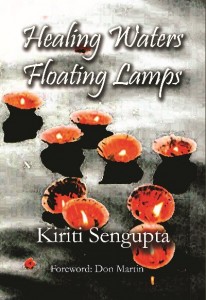Going through Healing Waters Floating Lamps, a selection of poems by Kiriti Sengupta made me remember few lines of Tocqueville (1835):
“In democracies it is by no means the case that all who cultivate literature have received a literary education, and most of those who have some belles-lettres are engaged in professions that only allow them to taste occasionally and by stealth the pleasures of the mind. Accustomed to the struggle, the crosses, and the monotony of practical life, poets require strong and rapid emotions, startling passages, truths or errors brilliant enough to rouse them up and to plunge them at once, as if by violence, into the midst of the subject.”
Why have I entertained these sentences is because the poet is a doctor by profession and going through his poems there is a feeling of well balanced liberation from the clutches of the laws of poetry. What emerges are encounters with the self, prodding the self to respond and contemplate.
This sleek volume with small poems are double-layered. First there is the observation with the five senses, the reality, we are comfortable with and then a second reading leads to another reality beyond words and sounds, smell and touch, where the ‘I’ withers to be at one with all.
The first poem in the volume “Beyond The Eyes” (mark the title) prepares the reader for other words, other lines on next pages of the book. It prepares us for an unknown universe, a space of different representations where the smell of infinity lingers.
I reach the sky
While I draw a circle in the water
Looking at the image
I take a dip
These lines invite the reader to take a dip in the water to create a world of their own. Water flows and so each pattern is replaced by another circle or oblong. In fact, transient. So is our material world.
As the poems progress the feeling of awareness snowballs into an all pervasive consciousness, an inner knowledge, attaining harmony with the outer world. Kiriti pushes us, prods us in each of his poems to listen, observe and be attentive to ourselves. The poet believes in living here and now in enjoying the world that encircles us and participating in the experience of the present. This is very much reflected in his poem titled “Celluloid.”
…I was hesitant, you know,
I never said goodbye
Signs are private, and I keep my eyes open.
Round the clock.
As the collection winds its way down the path of aloneness, a journey with the self, a certain certitude emerge – like putting faith in ordinary things and not accepting old mental program and rejecting external manipulation.
…The word “denser” does not
Necessarily mean thicker… (“Secure A River”)
Also in “Color Code”:
They said you were black
They knew they were white
…
And I said
This has been the Nelson Mandela patch.
The poems in Healing Waters Floating Lamps are to be read slowly, to ponder and think. Take for instance the poem on Varanasi. The title is the key. Here the poet does not name the poem Evening in Varanasi. He writes “Evening Varanasi”. As if Varanasi is a being, a symbol of spirituality. The mystic soul of India. Its body the meditating ground for those in search of oneness.
Have you seen the floating lamps in the river?
Water here is not the fire-extinguisher, but
The flames ascend through water
Prayers reach the meditating Lord
Both Bhagirath and Prometheus bought down river Ganga and Fire, respectively, from the heavens to bless mankind. So they are both images of life and all that is divine in the human. They are life-givers and mind-openers. The floating lamps are a reminder of this ephemeral world, which is floating and changing. Only mindfulness is real and that opens the door of super consciousness or God (Prayers reach the meditating Lord).
Again the poet very subtly plays with the theme of eternity in his poem “Memorandum Of Understanding”. Age is a human perception and we cannot bottle air in ancient and medieval, modern and post-modern bottles.
…I know
Air and age are linked
Since eternity…
Kiriti’s poems are a montage of responses to the everyday philosophy that runs subterranean in the orient. These experiences are common to all men. But the poet remembers them and give them form through words without frills. The poems are short and deeply suggestive, unlocking hidden areas of the self and not simply illustrating an object or an event. What is interesting that there are many ways of reading his poems. They are not restricted. They are like one long abstract painting, inviting the readers to come up with their own meaning, thereby making them participate in the poem. So as readers they are also writing. Perhaps, after reading Kiriti’s poetry the reader would turn to love and compassion in these days of online shopping, virtual friends and emotions in the shapes of smilies.
Sharmila Ray went to Presidency College and Calcutta University where she majored in History, did her Ph.D. on Durga and governance and subsequently joined City College, Kolkata under Calcutta University where she is now an Associate Professor and Head of the Department of History. She writes in English and has authored six books of poetry, most recently With Salt And Brine (Yeti Publishers, Calicut 2013). She has experimented her poems with Sarod (Indian string instrument) and the result is a CD— Journey Through Poetry And Music. Her poems are available in a CD- Hello. Her poems, short stories and non fictional essays have appeared in various national and international magazines and journals.
Note: this review first appeared in print and online in the Lost Coast Review, published by Avignon Press, California: http://www.lostcoastreview.com/healing-waters-floating-lamps

